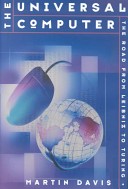Computers are everywhere today -- at work, in the bank, in artist's studios, sometimes even in our pockets -- yet they remain to many of us objects of irreducible mystery. How can today's computers perform such a bewildering variety of tasks if computing is just glorified arithmetic? The answer, as Martin Davis lucidly illustrates, lies in the fact that computers are essentially engines of logic. Their hardware and software embody concepts developed over centuries by logicians such as Leibniz, Boole, and Godel, culminating in the amazing insights of Alan Turing. The Universal Computer traces the development of these concepts by exploring with captivating detail the lives and work of the geniuses who first formulated them. Readers will come away with a revelatory understanding of how and why computers work and how the algorithms within them came to be.
In Collection
#5838
Read It:
Yes
#5838
Read It:
Yes
Artificial intelligence, Computers, Electronic Digital Computers, Electronic digital computers - History, Electronic Digital Computers/ History
|
|
||||||||||||||||||
Notes
This thoroughly enjoyable mix of biographical portraits and theoretical mathematics reveals how a sequence of logicians posed the conceptual questions and contributed the crucial insights resulting in the development of computers long before the technology was available to build even the simplest machines. An intriguing portrait of the great 17th-century mathematician G.W. Leibniz, a pivotal figure in the history of the search for human knowledge, launches this account by New York University professor emeritus Davis (Computability and Unsolvability). Steeped in Aristotelian ideas of perfection but trained in modern engineering, Leibniz conceived the idea of a universal system for determining truth. His contributions to this system are as diverse as the ingenious Leibniz Wheel (an early calculating machine) and the notation used today for calculus. His ideasDin particular, his recognition of the deep connection between systems of notation and actual physical devices for performing computationDinspired mathematicians and logicians, including George Boole, Gottlob Frege, Georg Cantor, David Hilbert and Kurt G del, until Alan Turing used them to develop the powerful mathematical tools that underlie modern computers as well as some of the earliest computer prototypes. After Leibniz, people thought about the problem of building computational systems; after Turing, people got busy building the machines. Davis has told the fascinating story in between. Full of well-honed anecdotes and telling detail, the book reads like a masterful lecture. Presenting key mathematical ideas in moderate depth, it also offers a solid introduction to the field of computer science that will captivate motivated readers. Agent, Alex Hoyt.
